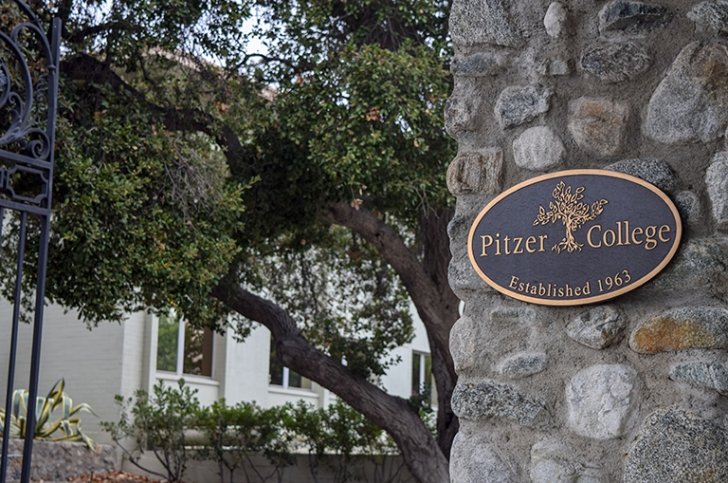A Season of Giving—and Passing It On
Pitzer College celebrates Thanksgiving on campus while extending support to local and regional communities

The smells of Thanksgiving dinner will drift from the Grove House again this year, continuing a Pitzer tradition that began 15 years ago when Grove House Kitchen and Programs Manager Zenia Meraz needed a space large enough for her extended family to gather.
What began as a simple family meal has grown into a beloved community event that brings together alumni, faculty, and students who cannot travel home for the short holiday. Last year, more than 75 people joined the feast.

“It’s a time of year when it’s important that everyone feels included. No one should be alone,” said Meraz, who has been at Pitzer for 19 years. Known for mentoring student workers as much as she cooks for them, Meraz has prepared the entire meal year after year with volunteer help.
This November, her menu will once again blend tradition with cultural variety: classic Thanksgiving dishes served alongside Asian, Filipino, Mexican, and other foods. “Anyone from The Claremont Colleges is welcome,” she added. “There is a place at the table for everyone.”
Meraz’s philosophy reflects the old saying that “charity begins at home”—but, as she and other members of the Pitzer community are demonstrating this season, it does not end there.
Rising Need, Rising Response
As the holiday season approached, Pitzer community members launched food drives and regional partnerships in response to growing hunger—heightened this year by frozen SNAP (CalFresh) benefits and intensified immigration enforcement in surrounding cities.
The numbers tell the story.
In Los Angeles County, some 1.5 million residents rely on CalFresh, and many are children, seniors, or people with disabilities. At the eastern edge of the county, The Claremont Colleges also interacts with the communities of the Inland Empire, where an estimated 713,000–753,000 residents also depend on SNAP and related forms of assistance.
McConnell Dining Hall: Feeding the Unhoused
For the past two years, Pitzer’s McConnell Dining Hall has quietly supported the Pomona Valley Christian Center’s food program for unhoused residents in Pomona.
The dining hall donates about 270–290 pounds of food each week, pausing only when the campus is closed.
“We donate everything we can,” said Miguel Menjivar, general manager of student dining. “We will continue to evaluate our program and optimize it.”
CEC Drives Holiday Support
The Community Engagement Center (CEC) coordinated Pitzer’s role in this year’s Misa Jornalera Food Drive, organized by the Pomona Economic Opportunity Center (PEOC). The Misa supports day laborers, many of whom face food insecurity due to lost work as well as ongoing ICE activity, which discourages some from seeking help at local pantries.
The CEC met its goal of collecting 500 food items by November 20. The center also maintained an ongoing collection of food and toiletries, delivered during PEOC’s biweekly Encuentros lunches.
In similar fashion, Pitzer’s Office of the President has likewise shifted its annual holiday reception drive from toys to food donations, reflecting the urgent need to provide more help to local families.
A Consortium-Wide Effort
This fall Pitzer also joined The Claremont Colleges in a virtual November fundraiser for the Los Angeles Regional Food Bank. With the food bank reporting only a two-and-a-half-week supply for area families during the federal government shutdown, the consortium mobilized quickly.
“Everyone responded so quickly and so generously,” said Alayna Session-Goins, Pitzer’s assistant vice president & dean of community life. “I knew our community would make this happen.”
By November 13—well ahead of schedule—the food bank announced on Instagram that it had reached its $10,000 goal, thanks to donations across the 5Cs.
Students Leading on Campus Food Justice
On campus, students such as Riley Thibodeau ’27 are addressing food insecurity through several student-led food justice initiatives.
One project, supported by the Claremont Student Worker Alliance, Pitzer EcoReps, and the Integrative Development Initiative (IDI), provides free weekly organic vegetable boxes to McConnell Dining Hall staff. IDI also composts McConnell’s food waste, which means that everything is being put to use.
Another effort—run through the distribution working group of the organization 5C Environmental Justice—recovers leftover food from campus events and delivers it to affordable housing residents and local street outreach programs.
“The issue of hunger is especially urgent,” Thibodeau said. “Every person deserves access to healthy food—it is a human right.”
Thibodeau is also part of a Justice Education Center initiative to make food available to students who remain on campus during breaks when most dining halls close.
Paying It Forward
As for the Grove House’s Meraz, she is already preparing for this year’s Day of Thanks feast, which is free to attend; guests are invited only to lend a hand in the kitchen or bring a dessert.
Her hope is simple.
“Food is something so basic. No one should ever be hungry,” she said. “We want people to feel loved and appreciated because that’s what they are. For me it’s all about passing on the love I’ve received in my life—and helping others feel empowered to do the same.”
News Information
Published
Author
Nick Owchar
Organization
- Dining Services
- Community Engagement Center (CEC)
- Campus Life
- The Grove House


